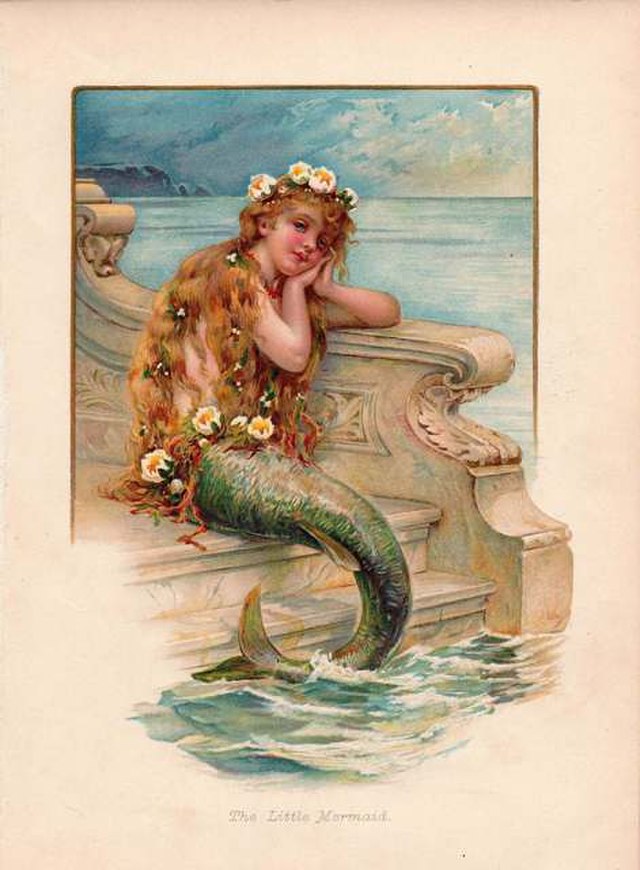The Little Mermaid by Hans Christian Andersen

"The Little Mermaid" by E. S. Hardy, public domain
Like a lot of people my age, I grew up on Disney's The Little Mermaid - and the original story by Hans Christian Andersen, of course. It's my all-time favorite fairy tale! Because of how much I love the original Little Mermaid, I also plan to reimagine it someday, so I figured it was time I discussed it with you. |
The Little Mermaid
The original Little Mermaid starts off quite similarly to the Disney interpretations, except mermaids aren't forbidden from going to the surface world. In fact, they're allowed to explore the surface when they turn fifteen. The Little Mermaid does this, and while she's up there, she falls in love with a human prince and saves him from drowning. Unable to stop thinking about the prince after returning home, the Little Mermaid asks her grandmother about humans. Her grandmother explains that humans don't live as long as mermaids. Instead, they have an eternal soul that rises to heaven when they die, while mermaids simply turn to sea-foam when they die. The Little Mermaid says she would trade a long life as a mermaid for an eternal soul. Her grandmother tells her not to think of such things, because the only way a mermaid can gain a soul is if a human loves her so much that they (essentially) give her a soul. You know where this is going. The Little Mermaid realizes she loves the human prince so much that she wants to be with him and gain an immortal soul, and she goes to the Sea Witch and asks for help. The Sea Witch gives her a potion that will make her human in exchange for her beautiful voice, but she won't be able to turn into a mermaid again, and every step she takes will hurt unbearably. Not only that, but if the prince doesn't love and marry her, she'll die and become sea-foam on the day he marries someone else. Desperate, the Little Mermaid agrees to these terms. She swims to the surface world, drinks the potion, and lives as a mute person. Every step she takes hurts her, sending agony arcing through her new legs, but the pain is worth it because during her time as a human, the prince befriends her. Sadly, though, the prince doesn't marry her. He marries someone else. On the night of the prince's wedding, the Little Mermaid's sisters come to her, their lovely long hair cut short. They know she's going to die, and they want to provide an alternative for her. They explain that they went to the Sea Witch and traded their hair for a magical dagger. They offer the weapon to the Little Mermaid, saying that if she kills the prince with it and spills his blood on her feet, she'll turn back into a mermaid; she'll be able to live a long life under the sea. In the end, the Little Mermaid can't bear to kill her beloved prince. She throws herself into the sea and turns to foam. This part makes me cry every time I read it - unrequited love is so hard, and the circumstances of the Little Mermaid's story make it worse. Thankfully, not all hope is lost. The Little Mermaid's body turns to foam, but her essence - her spirit, something she was told mermaids don't have - rises into the sky. She's informed by the "children of the air" that she can gain the immortal soul she desires if she spends three hundred years in service to the world. So even though she didn't win over her prince, she's given another chance to live forever. I imagine that if she had murdered the prince, she wouldn't have been given such a chance after eventually dying as a mermaid! Either way, this is an undeniably bittersweet conclusion. I do love it - as I said before, Little Mermaid is my all-time favorite fairy tale. However, I'm also grateful for the HEA alternatives we have today. I hope you enjoyed June 2023's favorite folktale! |

Receive a free book and never miss an update from A. P. Mobley by signing up for her newsletter, War on the Gods Army!
Thanks for joining War on the Gods Army!
Be sure to check your email inbox for your free book. If you don't see it, check your spam and promo folders for it.